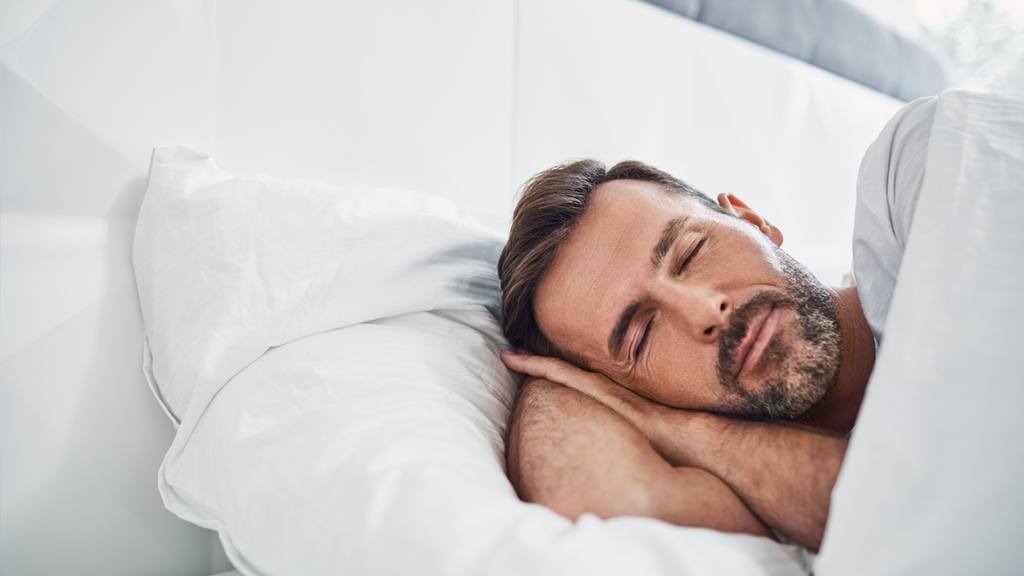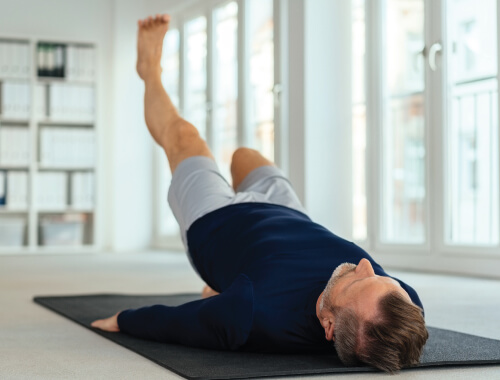
Article at a Glance
Sleep has been hailed as a critical factor contributing to our overall wellness for many decades, but diet and exercise are often perceived as the ultimate priorities for effective health management. Yet, nutrition and fitness cannot compensate for the effects of poor sleep quality. In fact, both the length of time we spend sleeping each night as well as the quality of the sleep we achieve play a major role in our vitality, largely dictating our risk of developing serious diseases such as type 2 diabetes and cardiovascular disease.
It can be safely assumed that everyone has experienced a poor night of sleep at least once in their lifetime, and although sleep deprivation is rampant across the country, it is impossible to gauge just how many individuals are affected by lost sleep. What we do know is that roughly 50-70 million U.S. adults have a sleep disorder.[1] With that said, even undiagnosed sleep issues raise serious concerns: both repeated instances of severe sleep deprivation as well as chronic sleep deprivation can have negative impacts on key health outcomes.
Within this guide, we will take a closer look at the complex ways in which sleep affects our health. We will also explore the most common causes of disordered sleep and present tactics for overcoming these and other impediments to achieving ample, quality sleep.
The Textbook of AgeManagement Medicine: Volume 1 highlights both short- and long-term consequences of sleep deprivation. On a short-term basis, individuals who have recently experienced a lack of sleep may experience:
On a long-term basis, consequences of sleep deprivation include:
Yet, the question remains: Why does lack of sleep increase our risk of these serious health issues? While there is still much to be learned about the impact of sleep on the body, we do know inflammation certainly plays a role in the relationship.
Inflammation is a well-established agent in the development of cardiovascular disease. A sustained increase in low-density lipoprotein (LPL, also known as the “bad” cholesterol), results in an accumulation of LDL in previously damaged arterial walls. This results in an inflammatory response that propagates plaque formation, thereby contributing to cardiovascular disease.
In the Textbook of Age Management Medicine: Volume 1, the relationship between sleep and inflammation is explored in great detail. In summation, sleep deprivation is inversely associated with plaque formation and coronary artery calcification in middle-aged adults. Sleep deprivation is also inversely associated with the thickness of the carotid intima-media or the innermost layer of artery walls. Several pro-inflammatory markers are inversely associated with sleep duration. In other words, the fewer hours a person sleeps, the more likely they are to experience elevated levels of inflammatory markers. In fact, these markers can be elevated in as little as one night of complete missed sleep. Because pro-inflammatory reactions are linked to a host of serious health conditions, such as stroke, cardiovascular disease, and type 2 diabetes, achieving the recommended number of hours of sleep each night is essential to long-term wellness.
Yet, while it is abundantly clear that sleep quality and duration are critical to health, many individuals still struggle to achieve a restful night of sleep. What are the most predominant barriers preventing us from achieving quality sleep?
There are many possible causes behind sleep deprivation, which is why the issue cannot be met with a “one-size-fits-all” approach to treatment. The inability to get to sleep – and remain sleeping for a full seven to nine hours – can be a result of either physical or psychological difficulties. For individuals struggling with psychological barriers, behavioral and cognitive treatments can be explored to enhance sleep without medical intervention.
With that said, many sleep issues are related to physical issues. Below, we’ll explore some of the most prevalent physical barriers to sleep.
Obstructive sleep apnea (OSA) occurs when the airflow is insufficient for metabolic demands. The collapse of the pharynx results in this obstruction: when muscle dilator activity becomes insufficient to maintain the pharynx, obstruction occurs.
Weight regulation is a key player in the prevention and treatment of OSA. Results of a randomized control study of patients with type 2 diabetes and an average BMI of 36 and an average AHI of 23.2 show individuals who lost 22 pounds or more in a one-year period witnessed an improvement of 9.7 in their AHI scores. They were also three times as likely to have a complete remission of OSA. The reduction of AHI scores was directly related to the degree of reduction in weight. It can therefore be concluded that OSA could simply be considered a complication of obesity in many cases.[3]
Weight loss, like sleep complications, cannot be approached the same way for every patient. A combination of reduction in calories, adherence to a healthy eating plan with restricted or no intake of processed foods, and a tailored exercise program can be personalized to meet the weight loss needs and goals, as well as the personal preferences and lifestyle considerations, of each patient. Compliance is the most critical factor of all weight loss endeavors, which is why starting with a patient-oriented approach is essential.
There is a suspected relationship between sleep disorders and hormones. Specifically, testosterone impacts the organization of circadian rhythms and the timing of sleep. This relationship takes on a cyclical pattern: total sleep deprivation can also lower testosterone.
Additionally, the Textbook of Age Management Medicine: Volume 1 indicates there is a relationship between hypogonadism, or the failure of the reproductive organs to produce appropriate hormone levels, and OSA. The text examines study findings that point to a significant negative correlation of testosterone levels with AHI, indicating that low testosterone is associated with higher OSA symptoms.
Testosterone has been observed to have a destabilizing effect on ventilation. Leuprolide used to treat androgen deprivation has been shown to increase apneic episodes, but it should be noted that these findings were discovered in studies performed on obese men. With that said, similar findings have been observed in hypogonadal men treated with testosterone replacement.
Hypogonadism in males can either be primary, meaning it originates from a problem in the testicles, or secondary. In the latter case, low hormone levels could result from an issue in the pituitary gland, or the part of the brain signaling the production of testosterone. This can be either an inherited trait or acquired as a result of injury, infection, normal aging, or obesity.[4]
The most effective treatment of hypogonadism is therefore dependent on its underlying cause. In obese patients, for example, dietary and lifestyle changes can be recommended to manage hypogonadism. Testosterone replacement therapy is also a viable form of treatment for many men and can result in increased energy, libido, erectile function, and an overall improved sense of wellbeing, in addition to improved sleep cycles. If the condition is a result of a pituitary issue, pituitary hormones may be administered to restore fertility and stimulate the production of sperm.
In addition to the factors described above, there are a number of other lifestyle considerations that could inhibit proper sleep. Sleep hygiene, a term that was coined in the late 1970s, aims to control environmental and behavioral factors that can promote better quality sleep through certain habits and practices. Worry and stress, the intake of stimulants such as alcohol, caffeine, and nicotine, failure to establish a regular sleep schedule, and exposure to light (including blue light from devices such as smartphones and tablets) can all impair sleep hygiene.[5]
Beyond treating known issues contributing to sleep problems such as obesity, OSA, and hormone imbalances, quality sleep may be achieved by making some simple adjustments to your daily routine. Here are some tips worth considering, which D’Alessandro recommends both for his clients and anyone seeking improved sleep behaviors:
Sleep is critical to mental and physical functionality at every stage of life, but it may have the greatest potential to be impacted as we age. When individuals experience natural age-related changes such as a decline in metabolism and hormonal variations, they may become more susceptible to conditions such as OSA, obesity, and other factors that influence sleep duration and quality. Thus, treating the underlying conditions contributing to sleep deprivation – rather than providing “quick fixes” for sleep issues – is essential to achieving lasting results.
Clinicians specializing in age management are therefore best equipped for helping middle-aged and older populations achieve better sleep. These experts take an all-encompassing approach to treatment, factoring in all of the different biomarkers which could impact sleep quality and duration. Through exercise, nutrition, and other lifestyle recommendations along with medical treatment if needed, they can help patients achieve better sleep patterns to make lasting improvements in sleep quality and duration, as well as overall wellness.
Register for your complimentary phone consultation.
We hope the information above assisted you in your research process.
This guide was produced with contributions from the following key resources:
The Textbook of AgeManagement Medicine Volume 1: Mastering Healthy Aging Nutrition, Exercise and hormone Replacement Therapy
Textbook Authors:
Jeffrey Park Leake, M.D., CPT
Dr. Jeffrey Park Leake is a Partner and Director of Education at Cenegenics Elite Health specializing in age management and wellness. Having trained hundreds of physicians worldwide, Dr. Leake is also the Director of Education for the Clinical Strategies for Healthy Aging course at AMM Education Foundation.
Todd David Greenberg, M.D., CSCS
Dr. Todd Greenberg is a practicing physician with a broad range of expertise, including wellness, exercise, sports injuries, and MRI of sports injuries. He is a Radiology Clinical Associate Professor at the University of Washington.
What is Age Management Medicine?
Watch Now: 3 Tips for Better Sleep
[1] “Sleep and Sleep Disorder Statistics.” American Sleep Association. Retrieved from URL: https://www.sleepassociation.org/about-sleep/sleep-statistics/
[2] “Sleep Deprivation: Symptoms, Causes, Treatments.” American Sleep Association. Retrieved from URL: https://www.sleepassociation.org/sleep-disorders/sleep-deprivation/.
[3] Foster et al. “A Randomized study on the effect of weight loss on obstructive sleep apnea among obese patients with type 2 diabetes: the Sleep AHEAD study.” Archives of Internal Medicine. 28 Sept. 2009. Retrieved from URL: https://www.ncbi.nlm.nih.gov/pubmed/19786682.
[4] “Male hypogonadism: Symptoms and treatment.” Journal of Advanced Pharmaceutical Technology & Research. Jul-Sept 2010. Retrieved from URL: https://www.ncbi.nlm.nih.gov/pmc/articles/PMC3255409/
[5] “Sleep Hygiene.” American Sleep Association. Retrieved from URL: https://www.sleepassociation.org/about-sleep/sleep-hygiene-tips/sleep-hygiene/.
[6] Kutscher, S.J. “Sleep and Athletic Performance.” Principles and Practices of Sleep Medicine. 646-652. 10.1016/B978-0-323-24288-2.00064-7.
 Contributor: Joshua D'Alessandro - MS, CSCS, CISSN Health Coach at Cenegenics New York City
Contributor: Joshua D'Alessandro - MS, CSCS, CISSN Health Coach at Cenegenics New York City
My name is Joshua D'Alessandro and I am an Exercise and Nutrition Counselor for Cenegenics in NY. My passion for fitness began at a very young age and has manifested into a career filled with possibilities. The countries largest epidemic, and quite possibly the root cause of most issues, is diminishing health. In my career, I hope to do everything and anything I can to improve the well being and lives of the people around me!


